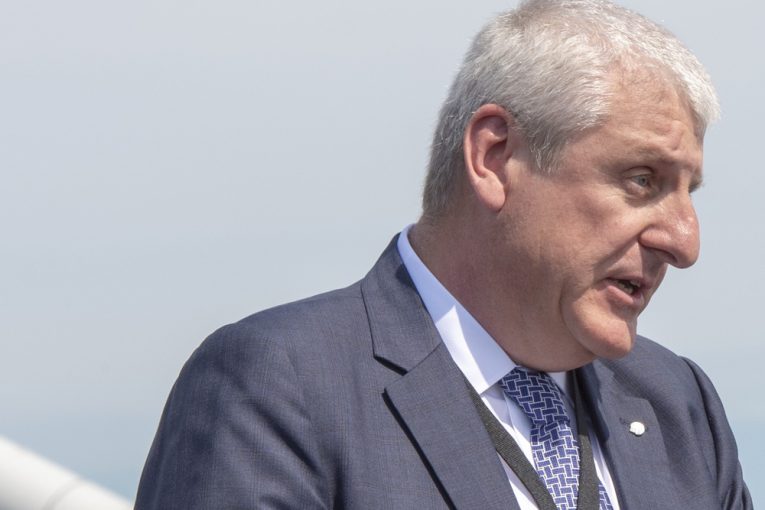
Montreal-based SNC-Lavalin Group Inc. announced a $2.1 billion loss in the second quarter on Thursday, and slashed its dividend by 80 per cent as it remained stuck in a downward slide that has persisted for months.
The earnings come less than two weeks after the company announced that it would reorganize its business into two distinct lines, with one unit comprised of the better-performing service business; meanwhile, a second unit will hold and service the rest of its lumpsum turn-key contracts, a business which SNC plans to exit after a spate of recent cost overruns.
During the call on Thursday, interim president and chief executive Ian Edwards told investors that the company’s earnings would improve in the second half of the year and pitched himself as the right person to lead the newly reorganized company.
“There’s so many procurement models within this industry… the real issue here is avoiding the contract models where the risk reward is not equitable any longer,” said Edwards. “Personally, I think I’m best placed to lead that and lead the company… but more importantly provide predictability in our business, predictability in our earnings and cash flow.”
He assumed the leadership role in May after his predecessor Neil Bruce retired amid a rocky year of missed earnings and other pitfalls.
“Personally, I think I’m best placed to lead that and lead the company… but more importantly provide predictability in our business, predictability in our earnings and cash flow
Ian Edwards
Much of SNC’s troubles date to last fall when federal prosecutors communicated to the company that they would not engage in settlement talks with the company, which faces criminal charges that its executives paid $48 million in bribes to Libyan government officials before 2011 in order to win lucrative contracts there.
The next court date is scheduled for September, and if the case proceeds to trial, and the company is convicted, it faces a potential ban from bidding on federal contracts — a mainstay of its business as an engineering, design and construction firm.
Its problems were compounded earlier this year when the company stopped winning new work in Saudi Arabia, which had been a major source of revenue, as a result of a diplomatic spat with Canada; also, the company announced a major mining contract in Chile, in which it is responsible for cost overruns, had left it on the hook for hundreds of millions of dollars in losses.
Other missteps have contributed to a 57 per cent stock slide from the start of the year when SNC shares traded at $46.20. On Thursday, having slid five per cent by midday, the shares stood at $19.76.
“I just think they need a complete overhaul of management,” said Michael Willemse, an analyst at Taylor Asset Management, an SNC investor. “I don’t know when that’s going to be, but I assume every day they’re closer to capitulating and saying it’s time.”
Still, he acknowledged that larger shareholders such as the pension fund, Caisse de depot et placement du Quebec, which controls just under 20 per cent of the shares, have more power to agitate for such change.
Last month, in a rare public critique, the Caisse issued a statement calling the company’s declining performance “a growing concern,” although it stopped short of calling for any specific changes in management.
On Thursday, SNC announced it is on track to achieve $100 million in cost savings by the end of 2019, and then $250 million in annual savings in the future. Edwards also announced a new project oversight function designed to manage its risk as its winds down its lumpsum turn-key contracts.
In a positive sign for management, Caisse spokesman Maxime Chagnon said the investment fund recognizes SNC’s “intention to address (its) current performance trend.”
On the earnings call, analysts suggested there were still many questions about the recently announced reorganization.
Chris Murray, of Altacorp Capital Inc., noted that the company has historically seeded its capital investment business through lumpsum turn-key contracts.
“Should we think about that business kind of winding down over time?” Murray asked.
The future of SNC’s capital business is important because it has provided stable value even as other units have flagged
But Edwards said the company would find opportunities to grow its capital business by offering design and other services on major infrastructure and construction projects.
The future of SNC’s capital business is important because it has provided stable value even as other units have flagged. In April, the company announced a deal to sell a 10.01 per cent stake in the 407 toll road — a highway that encircles the greater Toronto area that it helped build — for $3 billion.
While the sale is expected to help the company’s balance sheet, its closure has been delayed as an Ontario judge hears claim from competing potential buyers.
Meanwhile, in July, the credit rating agency DRBS Limited downgraded its issuer rating and senior debentures from stable to negative, citing “uncertainty” around its new reorganization and ability to execute.
Maxim Sytchev, an analyst with National Bank of Canada, wrote that the market’s main concern is whether SNC can wind down its lumpsum turn key contract backlog without incurring any major cost overruns, citing the $4.3 billion in infrastructure and resources contracts that will take place over the next year or more.
Despite the fact that SNC cancelled its guidance in late July and announced there would be losses, analyst still panned the earnings released Thursday.
“Losses were pre-released,” Sytchev wrote. “That being said, performance in most divisions is still underwhelming.”
• Email:
You can read more of the news on source
